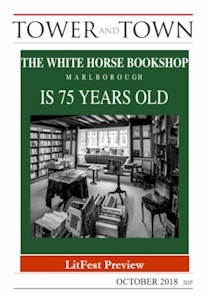

Tower and Town, October 2018 (view the full edition) (view the full edition)The Last Battle, by Peter HartThe story of the latter part of 1918 is brilliantly told by Peter Hart, guest speaker at this year's Marlborough LitFest, in his book The Last Battle. Peter is the oral historian at the Imperial War Museum, and builds his story round a wonderful collection of first-hand accounts of the fighting during those last four months. The book is appropriately detailed, but the reader is not suffocated by facts and a clear story-line emerges from the tales told by those who were there.
It is a year that lacks the high profile tragic stories of the Battles of the Somme (1916) and Passchendaele (1917), but its events were nevertheless of crucial importance in deciding the endgame. In a sequence of five ferocious offensives between March and July the Germans desperately sought the key to crushing the British and French armies, but despite losing large numbers not least as prisoners of war both armies managed to hold their ground in a series of fighting retreats. Having exhausted themselves in the process the Germans then became the object of four major counter-offensives by British, French and American forces in late July and August, recovering all the land lost earlier in the year. This was followed in late September by a further four planned and integrated Allied attacks which broke the back of the German defensive lines and their morale - it was at 6pm on September 28th that Ludendorff went to Hindenburg and told him that Germany must sue for peace. David Du Croz will be editing the next edition of Tower and Town, which he will devote to the impact of World War 1 on Marlborough. David Du Croz |